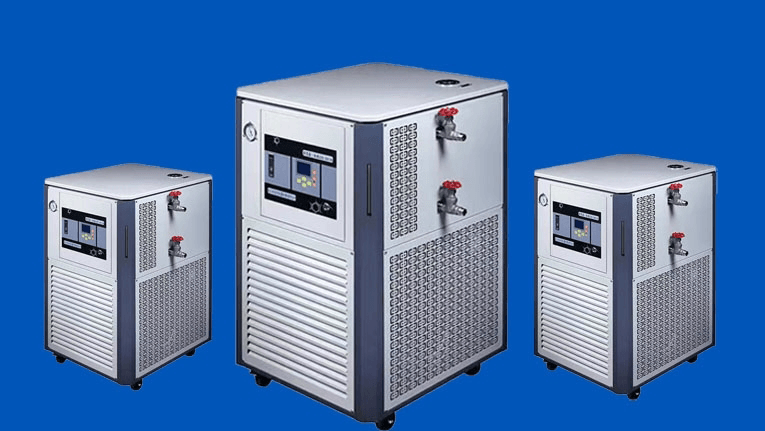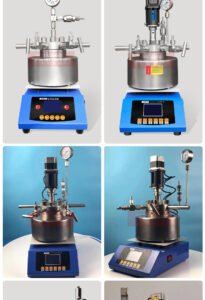Why Laboratory Temperature Control Equipment is Essential
In modern laboratories, temperature control plays a critical role in ensuring accurate results and maintaining consistency across various experiments and applications. Laboratory Temperature Control Equipment from EquilRxnLab is designed to meet the rigorous demands of scientific research, providing precise control over temperature to facilitate accurate testing and processes.
The Role of Temperature Control in Laboratories
Maintaining a consistent temperature is essential for many laboratory procedures, including chemical reactions, biological testing, and material synthesis. Fluctuations in temperature can compromise the results, leading to inaccurate conclusions or even failed experiments. This is why high-quality laboratory temperature control equipment is necessary for a range of applications, from pharmaceuticals to environmental testing.

Key Features of the Laboratory Temperature Control Equipment
EquilRxnLab’s Laboratory Temperature Control Equipment offers advanced features that provide optimal performance for diverse scientific applications. Let’s take a look at some of the critical specifications and how they benefit research and industrial applications:
- Temperature Stability: ±1°C
- Operating Temperature Range: -20°C to +200°C
- Ambient Temperature: 5°C to 35°C
- Best Ambient Humidity: ≤60%
- Power Supply: 1PH/220V/50Hz
- Total Power: 6.84 kW / 31.1A
- Cooling Power: 1.47 kW
- Heating Power: 5 kW
- Cooling Method: Air-cooled
These specifications ensure that the equipment provides a stable and reliable environment for scientific processes that require precise temperature control. Whether cooling or heating is needed, the air-cooled system effectively regulates the environment, making it ideal for various applications.
Applications of Laboratory Temperature Control Equipment
1. Chemical Synthesis
Chemical reactions often require precise temperature control to avoid undesired reactions or incomplete synthesis. With an operating temperature range of -20°C to +200°C, the Laboratory Temperature Control Equipment can maintain the optimal conditions for a variety of chemical processes, from basic organic reactions to complex synthetic routes.
2. Biological and Pharmaceutical Research
In biological research, temperature control is critical for enzyme activity, cell culture growth, and protein synthesis. The ±1°C temperature stability ensures that the system maintains optimal conditions for delicate biological experiments, helping researchers to achieve reproducible and accurate results.
3. Material Testing
Laboratory Temperature Control Equipment is widely used in material science, especially for testing materials’ performance at different temperatures. The system’s ability to provide both heating and cooling makes it suitable for thermal cycling and material stress testing, ensuring reliable data collection.
4. Environmental and Climate Testing
In environmental testing, where precise temperature control is required to simulate various climate conditions, this system is ideal. Whether simulating high heat or cold environments, the Laboratory Temperature Control Equipment delivers the stability and accuracy necessary for climate chambers and other testing setups.
Why Choose EquilRxnLab’s Laboratory Temperature Control Equipment?
1. High Precision and Stability
The ±1°C temperature stability ensures that the Laboratory Temperature Control Equipment provides precise temperature regulation, crucial for scientific research where accuracy is paramount.
2. Wide Operating Temperature Range
With a temperature range from -20°C to +200°C, this system is versatile enough to support a variety of applications, from cooling experiments to heating processes.
3. Efficient Energy Use
The air-cooled system ensures efficient temperature regulation without the need for additional cooling components, helping reduce energy consumption while maintaining optimal performance.
4. Easy Integration and Maintenance
The user-friendly control interface allows researchers to adjust settings with ease, while regular maintenance ensures continued high performance throughout its lifecycle.
5. Durability and Reliability
EquilRxnLab’s products are built to withstand rigorous laboratory environments. The system’s robust design ensures reliability, even under heavy use, providing researchers with the confidence they need for long-term experiments.
How to Use the Laboratory Temperature Control Equipment
Step 1: Setup and Calibration
Start by ensuring the system is connected to a 220V power supply. Set up the system in an environment with an ambient temperature between 5°C and 35°C. Once connected, calibrate the unit to ensure precise temperature readings.
Step 2: Set Desired Temperature
Adjust the temperature to meet the specific needs of your experiment, whether it’s cooling or heating. The system’s temperature range from -20°C to +200°C offers ample flexibility for diverse applications.
Step 3: Monitor and Maintain
Once the system is running, ensure that the ambient humidity stays within the recommended ≤60% range to prevent any disruptions in performance. Regularly monitor the equipment and perform maintenance to ensure consistent temperature control.
Step 4: Shutdown
After completing the experiment, turn off the system and store it in a safe, dry location. Regular maintenance ensures that the unit will function optimally for future use.
Where to Buy Laboratory Temperature Control Equipment
For those looking to purchase high-performance Laboratory Temperature Control Equipment, visit EquilRxnLab’s official product page:
Laboratory Temperature Control Equipment
You can also explore our full catalog of high-quality laboratory equipment:
EquilRxnLab Product Catalog
Stay Connected with EquilRxnLab
Keep up with the latest news, product releases, and scientific insights by following EquilRxnLab on social media:
For more information or inquiries, don’t hesitate to reach out to us through our Contact Page.
With EquilRxnLab’s Laboratory Temperature Control Equipment, you gain access to precision, versatility, and efficiency—essentials for maintaining optimal conditions in any scientific or industrial setting.



